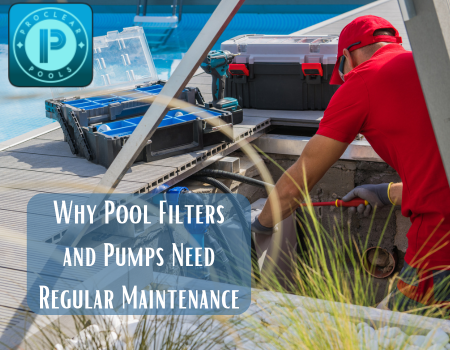Maintaining a clean and healthy swimming pool is more than just skimming debris or balancing chemicals. The heart of your pool’s circulation system—its pool filters and pumps—requires regular care and attention to ensure optimal performance. Neglecting these essential components can lead to costly repairs, energy inefficiency, and compromised water quality. Here’s why regular maintenance of pool filters and pumps is vital for the longevity and functionality of your pool.
-
 Ensures Clean and Healthy Water
Ensures Clean and Healthy Water
Pool filters play an important role in keeping your pool water safe and clean. They trap dirt, debris, and microscopic particles that could cloud the water or promote algae and bacteria growth.
- Filters: Regular cleaning prevents clogging, ensuring the filter continues to remove contaminants effectively.
- Pumps: By circulating the water, the pump ensures even distribution of chemicals, preventing stagnant areas where harmful bacteria can thrive.
Without regular maintenance, your pool water can become murky, unhealthy, and uninviting.
-
Extends the Life of Your Equipment
Filters and pumps are expensive to replace, making proper maintenance a cost-effective way to extend their lifespan. When debris and contaminants accumulate in the filter, they can overwork the pump, leading to overheating or mechanical failure.
- Regular cleaning: Prevents blockages and reduces strain on the pump.
- Timely inspections: Help identify minor issues before they escalate into significant problems.
Well-maintained equipment not only lasts longer but also saves you money in the long run.
-
Improves Energy Efficiency
A clogged filter or malfunctioning pump can force your pool system to work harder, consuming more energy and driving up utility costs.
- Blocked filters: Restrict water flow, causing the pump to run inefficiently.
- Malfunctioning pumps: May run longer than necessary to achieve proper circulation.
Routine maintenance keeps the system running smoothly, ensuring optimal energy use and reducing your carbon footprint.
-
Prevents Costly Repairs
Neglecting your pool’s filtration and circulation system can lead to expensive repairs or replacements. A clogged filter can cause pump motors to burn out, while poor circulation may result in algae infestations or chemical imbalances.
- Routine cleaning and checks: Can detect early signs of wear or damage.
- Timely repairs: Address small issues before they become significant, saving you from hefty repair bills.
Proactive maintenance is a fraction of the cost of repairing or replacing neglected equipment.
-
Maintains Optimal Pool Performance
A well-maintained pool filter and pump system ensures your pool remains inviting and enjoyable throughout the swimming season.
- Consistent water circulation: Prevents cold spots and ensures even distribution of heat and chemicals.
- Effective filtration: Keeps the water clear and free of debris.
Regular maintenance guarantees a pool environment that’s safe, comfortable, and visually appealing.
How to Maintain Your Pool Filters and Pumps
Proper care involves a combination of cleaning, inspection, and timely professional servicing:
-
Clean Filters Regularly
Remove and clean cartridge filters every 1-2 weeks, or as recommended by the manufacturer.
Backwash sand or DE filters when the pressure gauge indicates a need, typically every few weeks.
-
Monitor Water Levels
Make sure the water level remains at least halfway up the skimmer opening. Low water levels can cause the pump to run dry, while high levels reduce filtration efficiency.
-
Check and Lubricate Pump Components
Inspect pump seals, o-rings, and gaskets regularly for wear. Put some lubrication to the moving parts as needed, in order to ensure smooth operation, and to prevent friction.
-
Schedule Professional Inspections
Even with diligent maintenance, professional inspections can identify issues you might miss. A technician can check for leaks, test electrical components, and optimize system performance.
Common Maintenance Mistakes to Avoid
Skipping filter cleaning: Neglected pool filters can lead to poor water quality and overworked pumps.
- Over-cleaning pool filters: Cleaning too often can reduce their effectiveness. Always follow manufacturer guidelines.
- Neglecting off-season care: Proper winterization prevents damage and ensures a smooth start to the next swimming season.
Regular maintenance of your pool’s filters and pumps is the key to a clean, healthy, and efficient swimming pool. By investing time in routine care and addressing minor issues promptly, you can avoid costly repairs, extend the lifespan of your equipment, and enjoy crystal-clear water all season long. Whether you handle maintenance yourself or hire a professional, keeping your pool system in top condition is well worth the effort.
